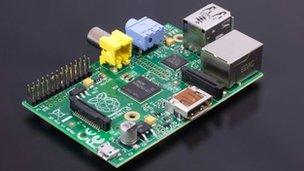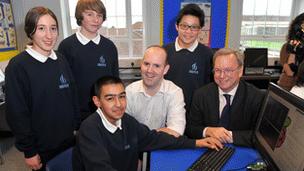Google to give schools Raspberry Pi microcomputers
- Published
Google chairman Eric Schmidt: "The Raspberry Pi is first and foremost a very clever design"
Schools around the UK are to be given 15,000 free microcomputers, with a view to creating a new generation of computer scientists.
Funded by Google, the Raspberry Pi Foundation hopes the free devices will inspire children to take up coding.
The pared-down Raspberry Pi, launched a year ago, is already a huge success.
There are concerns current information and communications technology (ICT) teaching is inadequate preparation for the future jobs in technology.
Skill decline
The partnership was announced at Chesterton Community College in Cambridge, where children were given a coding lesson by Google's chairman Eric Schmidt and Raspberry Pi co-founder Eben Upton.

The Raspberry Pi may not look pretty but it has inspired many innovations
"We hope that our new partnership with Google will be a significant moment in the development of computing education in the UK," said Mr Upton.
"We believe that this can turn around the year-on-year decline in the numbers and skill sets of students applying to read computer science at university."
Over the past decade, the number of people studying computer science in the UK dropped by 23% at undergraduate level and by 34% at graduate level.
British innovators
To help ensure teachers and children get the best out of the devices, Google and Raspberry Pi are working with six educational partners, including Code Club, Computing at School, Generating Genius and Coderdojo. They will distribute the devices to schools around the UK.
In the past Mr Schmidt has said ICT teaching in the UK puts too much emphasis on using, rather than creating, software.
Announcing Google's Raspberry Pi giveaway, on Tuesday, he said: "Britain's innovators and entrepreneurs have changed the world - the telephone, television and computers were all invented here.
"We have been working to encourage the next generation of computer scientists and we hope this donation... to British school pupils will help drive a new wave of innovation."
Google is also sponsoring ICT teacher training via a scheme in conjunction with the Teach First charity.
Sponsorship suspicions
It has led some critics to question whether large corporations such as Google should take on such a role.
"Schools are increasingly being used as marketing venues by companies promoting their own brands in return for teaching resources, books, sports equipment or computers," said a National Union of Teachers representative.

Eric Schmidt joined students in Cambridge for a coding lesson
"Commercial sponsorship of school resources and equipment and their involvement in training can actively undermine teachers' efforts to educate children about the dangers of manipulation and commercial exploitation."
Rival Microsoft has also called for a shake-up of how computer science is taught in the UK.
"Computer science is something that we have been calling the 'fourth science' for some time. We believe that it is every bit as important as physics, chemistry and biology," said Steve Beswick, director of education at Microsoft.
"By formally introducing children to computer science basics at primary school, we stand a far greater chance of increasing the numbers taking the subject through to degree level and ultimately the world of work."
- Published29 January 2013
- Published17 December 2012
- Published23 November 2012
- Published14 September 2012